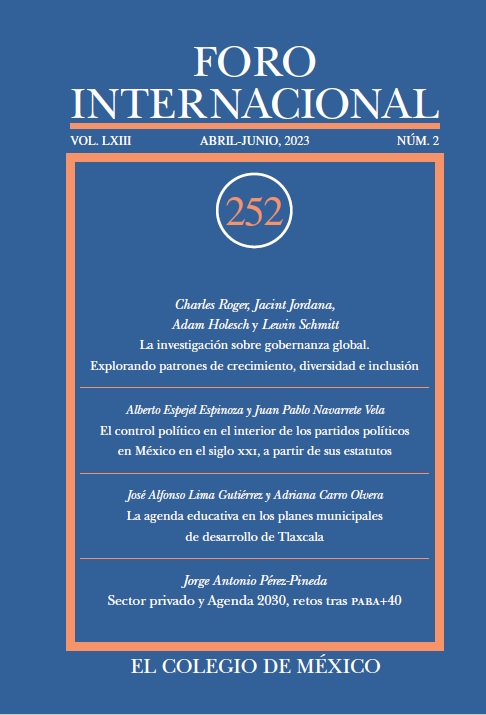Global Governance research: exploring patterns of growth, diversity, and inclusion
DOI:
https://doi.org/10.24201/fi.v63i2.2984Keywords:
global governance , international relations , research, publishing, diversity, inclusionAbstract
Global governance has been widely embraced as an object of analysis and as a way of “seeing” world politics. Yet we still know little about how publishing has evolved. This article presents the first systematic exploration of these patterns. It uses an original dataset of global governance research to answer three first-order questions: How has publishing varied over time? What issues have scholars focused on? And who has been publishing in the field? The authors found that research has grown and become increas- ingly diverse—but selectively so. Some marginalized issues feature more prominently than in the rest of international relations, but there are blind spots too. Further, while research is less American and women have been comparatively more active relative to other areas, geographical diversity remains extremely limited. Scholars based in the Global South have been the first authors of less than 14 percent of all publications. To conclude, the article reflects on implications for the field.
Downloads
References
ACHARYA, Amitav y Barry BUZAN, The Making of Global International Relations: Origins and Evolution of IR at Its Centenary, Cambridge, Cambridge University Press, 2019. DOI: https://doi.org/10.1017/9781108647670
BA, Alice D. y Matthew J. HOFFMANN, Contending Perspectives on Global Governance: Coherence, Contestation, and World Order, Nueva York, Routledge, 2005. DOI: https://doi.org/10.4324/9780203002810
BARNETT, Michael y Raymond DUVALL, Power in Global Governance, Cambridge, Cambridge University Press, 2005. DOI: https://doi.org/10.1017/CBO9780511491207
COEN, David y Tom PEGRAM, “Towards a Third Generation of Global Governance Scholarship”, Global Policy, vol. 9, núm. 1, 2018, pp. 107-113. DOI: https://doi.org/10.1111/1758-5899.12527
COOLEY, Alexander y Daniel NEXON, Exit from Hegemony: The Unraveling of the American Global Order, Oxford, University Press, 2020. DOI: https://doi.org/10.1093/oso/9780190916473.001.0001
DINGWERTH, Klaus y Philipp PATTBERG, “Global Governance as a Perspective on World Politics”, Global Governance 12 (2) (2006), 185-203. DOI: https://doi.org/10.1163/19426720-01202006
FALK, Richard, “Liberalism at the Global Level: The Last of the Independent Commissions?”, Millennium: Journal of International Studies, vol. 24, núm. 3, 1995, pp. 563-576. DOI: https://doi.org/10.1177/03058298950240030401
FATTORE, Christina, “Nevertheless, She Persisted: Women’s Experiences and Perceptions within the International Studies Association”, International Studies Perspectives, vol. 20, núm. 1, 2019, pp. 46-62. DOI: https://doi.org/10.1093/isp/eky006
FRANKE, Ulrich y Matthias HOFFERBERTH, “Proclaiming a Prophecy Empty of Substance? A Pragmatist Reconsideration of Global Governance”, Journal of International Political Theory, vol. 18, núm. 3, 2021, pp. 312-225. DOI: https://doi.org/10.1177/17550882211028778
GOH, Evelyn, “US Dominance and American Bias in International Relations Scholarship: A View from the Outside”, Journal of Global Security Studies, vol. 4, núm. 3, 2019, pp. 402-410. DOI: https://doi.org/10.1093/jogss/ogz029
GREEN, Jessica F. y Thomas N. HALE, “Reversing the Marginalization of Global Environmental Politics in International Relations: An Opportunity for the Discipline”, PS-Political Science and Politics, vol. 50, núm. 2, 2017, pp. 473-479. DOI: https://doi.org/10.1017/S1049096516003024
HALE, Thomas, David HELD y Kevin YOUNG, Gridlock: Why International Cooperation Is Failing when We Need It Most, Cambridge, UK, Polity Press, 2013.
HOFFERBERTH, Matthias, “«Confusion Is a Fundamental State of Mind» –On the Peculiar Intellectual Career of Global Governance in International Relations”, Palgrave Communications, vol. 2, núm. 1, 2016, pp. 1-11. DOI: https://doi.org/10.1057/palcomms.2015.44
HOFFMANN, Stanley, “An American Social Science: International Relations”, Daedalus, vol. 106, núm. 3, 1977, pp. 41-60.
HUTCHINGS, Kimberly y Patricia OWENS, “Women Thinkers and the Canon of International Thought: Recovery, Rejection, and Reconstitution”, American Political Science Review, vol. 115, núm. 2, 2021, pp. 347-359. DOI: https://doi.org/10.1017/S0003055420000969
JORDANA, Jacint, Lewin SCHMITT y Adam HOLESCH, “Mapping the Global Governance Research Landscape”, GLOBE Blog, 2 de abril de 2020, https://www.globe‑project.eu/en/mapping‑the‑global‑governance‑research‑landscape_8683
KNIGHT, W. Andy, Neil MACFARLANE y Thomas WEISS, “Swan Song: From 7:1 to 11:4”, Global Governance, vol. 11, núm. 4, 2005, pp. 527-535. DOI: https://doi.org/10.1163/19426720-01104008
KRISTENSEN, Peter Marcus, “Revisiting the «American Social Science» –Mapping the Geography of International Relations”, International Studies Perspectives, vol. 16, núm. 3, 2015, pp. 246-269. DOI: https://doi.org/10.1111/insp.12061
LOHAUS, Mathis y Wiebke WEMHEUER-VOGELAAR, “Who Publishes Where? Exploring the Geographic Diversity of Global IR Journals”, International Studies Review, vol. 23, núm. 3, 2020, pp. 1-25. DOI: https://doi.org/10.1093/isr/viaa062
MALINIAK, Daniel, Amy OAKES, Susan PETERSON y Michael J. TIERNEY, “Women in International Relations”, Politics and Gender, vol. 4, núm. 1, 2008, pp. 122-144. DOI: https://doi.org/10.1017/S1743923X08000068
MALINIAK, Daniel, AMY Oakes, Susan PETERSON y Michael J. TIERNEY, “International Relations in the US Academy”, International Studies Quarterly, vol. 55, núm. 2, 2011, pp. 437-464. DOI: https://doi.org/10.1111/j.1468-2478.2011.00653.x
MALINIAK, Daniel, Susan PETERSON, Ryan POWERS y Michael J. TIERNEY, TRIP 2017 Faculty Survey. Teaching, Research, and International Policy Project, Williamsburg, VA, Global Research Institute, 2017, https://trip.wm.edu/
MALINIAK, Daniel, Susan PETERSON, Ryan POWERS y Michael J. TIERNEY, “Is International Relations a Global Discipline? Hegemony, Insularity, and Diversity in the Field”, Security Studies, vol. 27, núm. 3, 2018, pp. 448-484. DOI: https://doi.org/10.1080/09636412.2017.1416824
MALINIAK, Daniel, Ryan POWERS y Barbara F. WALTER, “The Gender Citation Gap in International Relations”, International Organization, vol. 67, núm., 2013, pp. 889-922. DOI: https://doi.org/10.1017/S0020818313000209
MENDLOVITZ, Saul H., “World Government in Year 2000: By Cataclysm, Drift or Design”, Carroll Daily Times Herald, 23 de diciembre de 1975.
MENDLOVITZ, Saul H., On the Creation of a Just World Order: Preferred Worlds for the 1990’s, Nueva York, Free Press, 1975.
ROGER, Charles y Peter DAUVERGNE, “The Rise of Transnational Governance as a Field of Study”, International Studies Review, vol. 18, núm. 3, 2016, pp. 415-437. DOI: https://doi.org/10.1093/isr/viw001
ROSENAU, James N., “Governance in the Twenty-first Century”, Global Governance, vol. 1, núm. 1, 1995, pp. 13-43. DOI: https://doi.org/10.1163/19426720-001-01-90000004
ROSS, Gordon J., “Parametric and Nonparametric Sequential Change Detection in R: The Cpm Package”, Journal of Statistical Software, vol. 66, núm. 3, 2015, pp. 1-20. DOI: https://doi.org/10.18637/jss.v066.i03
SEABROOKE, Leonard y Kevin L. YOUNG, “The Networks and Niches of International Political Economy”, Review of International Political Economy, vol. 24, núm. 2, 2017, pp. 288-331. DOI: https://doi.org/10.1080/09692290.2016.1276949
WEISS, Thomas G. y Rorden WILKINSON, Rethinking Global Governance, Cambridge, Reino Unido, Polity Press, 2019.
ZVOBGO, Kelebogile y Meredith LOKEN, “Why Race Matters in International Relations”, Foreign Policy, núm. 237, 2020, pp. 11-13.













